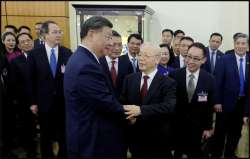China's Xi Jinping visits Vietnam after Hanoi resets ties with US, calls for 'mutually acceptable solutions'
This is Xi's first visit to Vietnam since 2017 amid reports that Beijing fears Vietnam possibly joining an anti-China alliance. Vietnam upgraded its ties with the US to a comprehensive strategic partnership during Biden's visit in September, much to Beijing's chagrin.

Chinese President Xi Jinping on Tuesday arrived in Vietnam to deepen ties with the Southeast Asian country, weeks after Hanoi elevated diplomatic relations with the United States, Beijing's key rival, and Western-aligned countries. This is Xi's first visit to Vietnam since 2017 amid reports that Beijing fears Vietnam possibly joining an anti-China alliance.
After meeting with key Vietnamese officials on several topics, Xi struck a reconciliatory tone by saying that the two countries should find "mutually acceptable solutions" to settle their differences, particularly on the matter of the South China Sea. Vietnam is among the countries opposing Chinese aggression in the disputed waters.
Xi further said that China and Vietnam have “camaraderie plus brotherhood" and should always remember their shared visions and missions. "Both sides need to act on the common understandings reached by the leaders of our two parties and countries, properly manage differences on maritime issues, and jointly look for mutually acceptable solutions," he said.
During his visit, Xi met Communist Party General Secretary Nguyen Phu Trong, President Vo Van Thuong and Prime Minister Pham Minh Chinh, according to Vietnam's Foreign Ministry. His visit also marks 15 years of China being a “comprehensive strategic partner” of Vietnam, the highest official designation for a diplomatic relationship.
His visit is expected to reset China's ties with Vietnam with several deals on the table, including the opening of Chinese markets for Vietnamese goods.
Simmering tensions
Vietnam, The Philippines, Malaysia, Brunei and Taiwan have countered China's claims in the South China Sea, most of which is claimed by Beijing. The South China Sea has now become a new area of regular confrontation, particularly between China and the Philippines, having now become a daily occurrence.
As recently as Sunday, the Philippines and China traded accusations on Sunday over a collision of their vessels near a disputed shoal in the South China Sea as tensions over claims in the vital waterway escalate. The Philippine coast guard accused China of firing water cannons and ramming resupply vessels and a coast guard ship, causing "serious engine damage" to one, while China's coast guard said the Philippine vessel intentionally rammed its ship.
The Philippines has also restored its close ties with the US under the Presidency of Bongbong Marcos. China fears that Vietnam may follow the same route with its growing relations with Washington.
Competing with the US
US President Joe Biden visited Vietnam in September after the G20 Summit and marked the elevation of its ties with Hanoi to a Comprehensive Strategic Partnership, much to the chagrin of China. The US and Vietnam agreed to bury the hatchet of their bitter war during Vietnam's independence movement in the 1970s.
Vietnam also improved its security and economic ties with Japan, a Western-allied country, citing a "free and open Indo-Pacific". Japan also has the same diplomatic status as the US and China and is Vietnam's third-largest foreign investor.
Vietnam is seen as a tough neighbour in China as it fought a border war with it in 1979, inflicting heavy casualties and remained steadfast in opposing Beijing's expansive claims over the disputed South China Sea, besides attracting foreign investments from China. Despite that, China has been Vietnam’s largest trading partner for several years, with a bilateral trade turnover of $175.6 billion in 2022.
Ahead of Xi's visit, Chinese Foreign Minister Wang Yi visited Vietnam earlier this month during which he proposed an increase in trade connectivity and upgrading of railway links between both countries. He said that both countries should actively promote cooperation with mutual benefits.
(with inputs from agencies)
ALSO READ | 'China fires water cannons': Philippines, Beijing trade accusations over South China Sea collision
